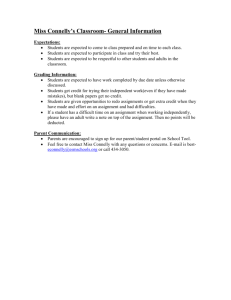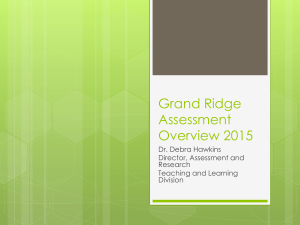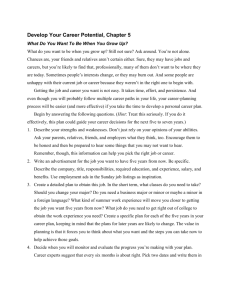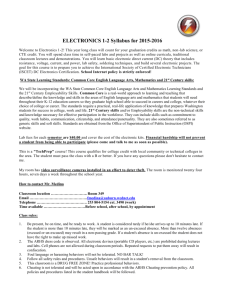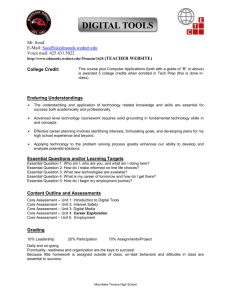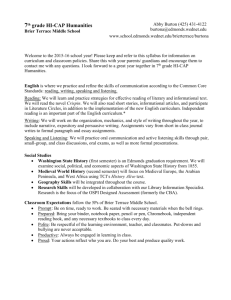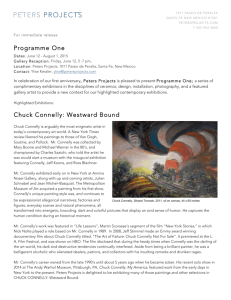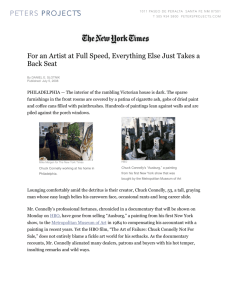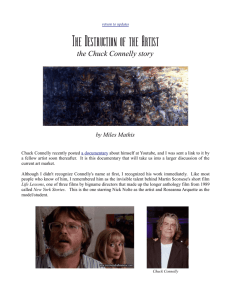Humanities syllabus - Auburn School District
advertisement
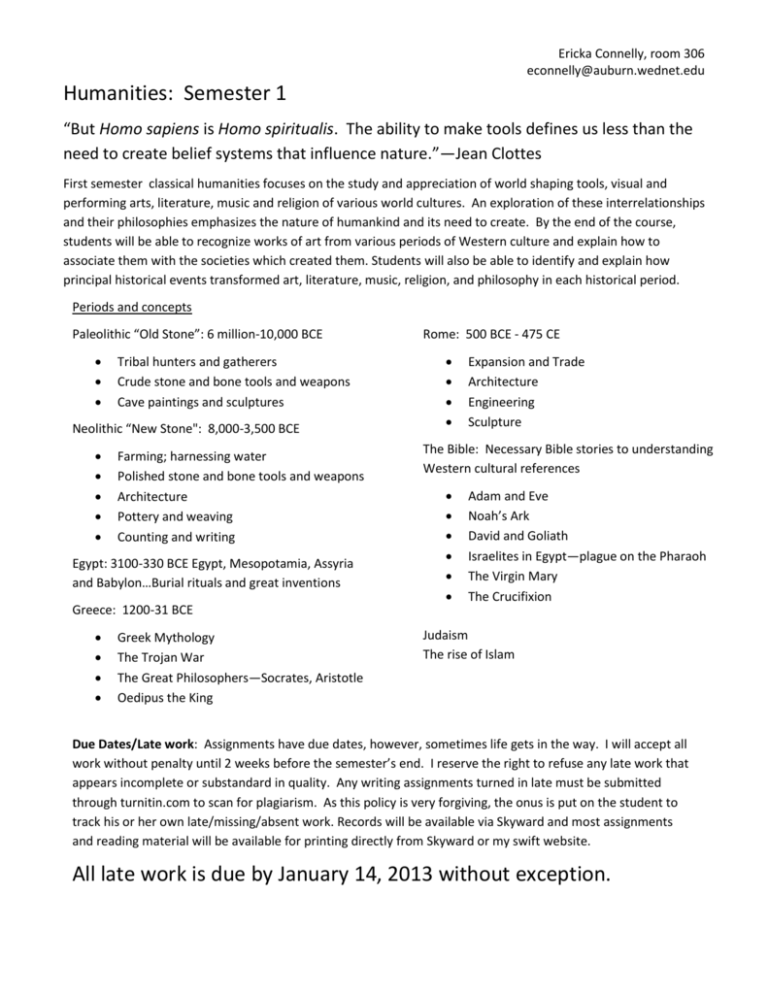
Ericka Connelly, room 306 econnelly@auburn.wednet.edu Humanities: Semester 1 “But Homo sapiens is Homo spiritualis. The ability to make tools defines us less than the need to create belief systems that influence nature.”—Jean Clottes First semester classical humanities focuses on the study and appreciation of world shaping tools, visual and performing arts, literature, music and religion of various world cultures. An exploration of these interrelationships and their philosophies emphasizes the nature of humankind and its need to create. By the end of the course, students will be able to recognize works of art from various periods of Western culture and explain how to associate them with the societies which created them. Students will also be able to identify and explain how principal historical events transformed art, literature, music, religion, and philosophy in each historical period. Periods and concepts Paleolithic “Old Stone”: 6 million-10,000 BCE Tribal hunters and gatherers Crude stone and bone tools and weapons Cave paintings and sculptures Neolithic “New Stone": 8,000-3,500 BCE Farming; harnessing water Polished stone and bone tools and weapons Architecture Pottery and weaving Counting and writing Egypt: 3100-330 BCE Egypt, Mesopotamia, Assyria and Babylon…Burial rituals and great inventions Greece: 1200-31 BCE Greek Mythology The Trojan War The Great Philosophers—Socrates, Aristotle Oedipus the King Rome: 500 BCE - 475 CE Expansion and Trade Architecture Engineering Sculpture The Bible: Necessary Bible stories to understanding Western cultural references Adam and Eve Noah’s Ark David and Goliath Israelites in Egypt—plague on the Pharaoh The Virgin Mary The Crucifixion Judaism The rise of Islam Due Dates/Late work: Assignments have due dates, however, sometimes life gets in the way. I will accept all work without penalty until 2 weeks before the semester’s end. I reserve the right to refuse any late work that appears incomplete or substandard in quality. Any writing assignments turned in late must be submitted through turnitin.com to scan for plagiarism. As this policy is very forgiving, the onus is put on the student to track his or her own late/missing/absent work. Records will be available via Skyward and most assignments and reading material will be available for printing directly from Skyward or my swift website. All late work is due by January 14, 2013 without exception. Ericka Connelly, room 306 econnelly@auburn.wednet.edu Test retakes: Students may retake tests. Note that test questions and/or format may change. Again, it is the student’s responsibility to request specifically what s/he wishes to make up. Test retakes will only be available on testing day in class with proof of practice (homework) or by negotiated appointment outside of class. As a standard’s based class that is participating in the district pilot program, your grade will be based on 100% assessment. Much of the work we do in class will be guided practice and may not be collected or graded; however, some will to monitor who is taking advantage of the practice as well as to check for comprehension. Most tests are open-note; therefore, participation in class is critical. Below are the standards on which your grade will be based: Reading: Read and comprehend literature and informational texts 1. (Summary of Reading) Summarize key ideas/concepts of texts appropriate to grade level; identify central ideas of text. 2. (Evidence in Reading) Cite strong textual evidence to support analysis of what the text says explicitly as well as inferences drawn from text. 3. (Independent Reading) Read and comprehend complex literary and/or informational text independently and proficiently. Writing: Produce clear, coherent detailed writing. 1. (Argument Writing) Writes arguments to support claims in analysis of substantive topics or texts utilizing coherent organization, valid reasoning, and relevant and sufficient evidence. 2. (Explanatory Writing) Writes to examine and convey complex ideas and information accurately through the effective selection, organization, and analysis of content and coherent organization. 3. (Narrative Writing) Write narratives to develop real imagined experiences that engage and orient the reader, establishing conflict, POV, narrator and characters, and a smooth progression of events. Includes sensory details. Writing Conventions: Demonstrate command of conventions of standard English grammar, spelling, capitalization, and punctuation; organization and style are appropriate to task. Word Usage: Accurately uses content specific vocabulary words; accurately identifies and employees Greek and Latin roots, prefixes and suffixes; and correctly demonstrates use of commonly misused words. Research: Conduct research to gather background information and/or attempt to answer a question, utilizing/synthesizing multiple sources—listing and documenting when necessary. Communication: Participate effectively in a range of discussions and present information, findings, and supporting evidence. Content: Accurately answer questions related to humanities content—art, religion, innovations suspending personal/cultural bias to recognize as a process of history. All students must register and use turnitin.com to check for plagiarism. Plagiarism policy to be discussed separately. Ericka Connelly, room 306 econnelly@auburn.wednet.edu Overall Grading Scale A= 100%-93% A-=92%-90% B+=89%-87% B=86%-83% B-=82%-80% C+=79%-77% C=76%-73% C-=72%-70% D+=69%-67% D=66%-60% F=59% and below Assessment Grading Scale Assessments will be graded as follows: 7 = mostly understands concept/delivered passably well 8 = generally understands concept/delivered fairly well 9 = clearly understands concept/delivered very well 10 = understanding of concept & delivery are outstanding X = understanding and/or delivery require practice and a re-do; entered into the gradebook as a 5; no evidence = 0 Parents: In humanities, we watch a fair amount of film, some documentaries that are not rated as well as one film that is rated R, but censored by me for brief nudity. If ever you have questions as to content or curriculum please do not hesitate to call or email to voice concerns. As we deal with a lot of art and religion from the beginning of human existence up until modern times, it is my intent to push students to think beyond their current frame of reference, but also to be respectful of personal beliefs as well as creating an environment of safety to share. King Tut field trip We have a special opportunity this year only in humanities. We will be going to see the King Tut exhibit at the Pacific Science Center on October 18th before it returns to Egypt forever. The trip is completely paid for, but I need to know whether you intend to participate in this all school-day event by 9/14. I am also looking for parent participants to chaperone. I need five adults who are willing to have their driver’s license checked against state patrol and can commit to attending from 8am until the end of the school day. Contact Information Teacher: Mrs. Ericka Connelly Room: 306 E-mail: econnelly@auburn.wednet.edu Phone: (253) 931-4719 ext. 1306 I am available for calls from 7:35 to 8:00 am and between 2:40 to 3:00 pm. I have 5th period planning and can schedule a call between 12:40 and 1:35pm. Please do not call during class time. E-mail is the best way to contact me. I look forward to a great collaboration between student, parent(s)/guardians and myself. Please keep in contact. Ericka Connelly, room 306 econnelly@auburn.wednet.edu Ericka Connelly, room 306 econnelly@auburn.wednet.edu To be detached and returned to Mrs. Connelly by September 14th. My family and I have read all of the information regarding the expectations for American Literature and Writing class, and agree to the requirements of the class. Signature: ___________________________ Printed Name: ____________________ (student) (student) Signature: ___________________________ Printed Name: ____________________ (parent/guardian) (parent/guardian) E-mail address: ____________________________________________________________ (parent/guardian) Date: _______________ I give my permission for ____________________ to watch film deemed appropriate for humanities class. Signature: ______________________________________
